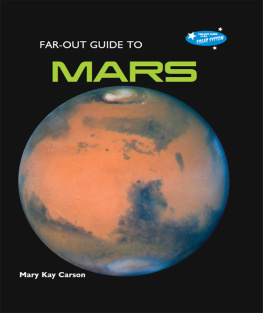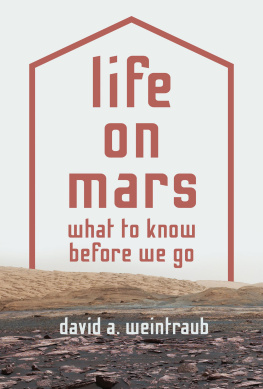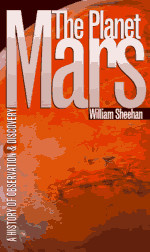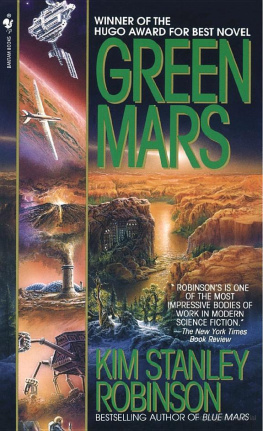Simon Morden - The Red Planet: A Natural History of Mars
Here you can read online Simon Morden - The Red Planet: A Natural History of Mars full text of the book (entire story) in english for free. Download pdf and epub, get meaning, cover and reviews about this ebook. year: 2022, publisher: Pegasus Books, genre: Home and family. Description of the work, (preface) as well as reviews are available. Best literature library LitArk.com created for fans of good reading and offers a wide selection of genres:
Romance novel
Science fiction
Adventure
Detective
Science
History
Home and family
Prose
Art
Politics
Computer
Non-fiction
Religion
Business
Children
Humor
Choose a favorite category and find really read worthwhile books. Enjoy immersion in the world of imagination, feel the emotions of the characters or learn something new for yourself, make an fascinating discovery.

- Book:The Red Planet: A Natural History of Mars
- Author:
- Publisher:Pegasus Books
- Genre:
- Year:2022
- Rating:3 / 5
- Favourites:Add to favourites
- Your mark:
- 60
- 1
- 2
- 3
- 4
- 5
The Red Planet: A Natural History of Mars: summary, description and annotation
We offer to read an annotation, description, summary or preface (depends on what the author of the book "The Red Planet: A Natural History of Mars" wrote himself). If you haven't found the necessary information about the book — write in the comments, we will try to find it.
The Red Planet: A Natural History of Mars — read online for free the complete book (whole text) full work
Below is the text of the book, divided by pages. System saving the place of the last page read, allows you to conveniently read the book "The Red Planet: A Natural History of Mars" online for free, without having to search again every time where you left off. Put a bookmark, and you can go to the page where you finished reading at any time.
Font size:
Interval:
Bookmark:
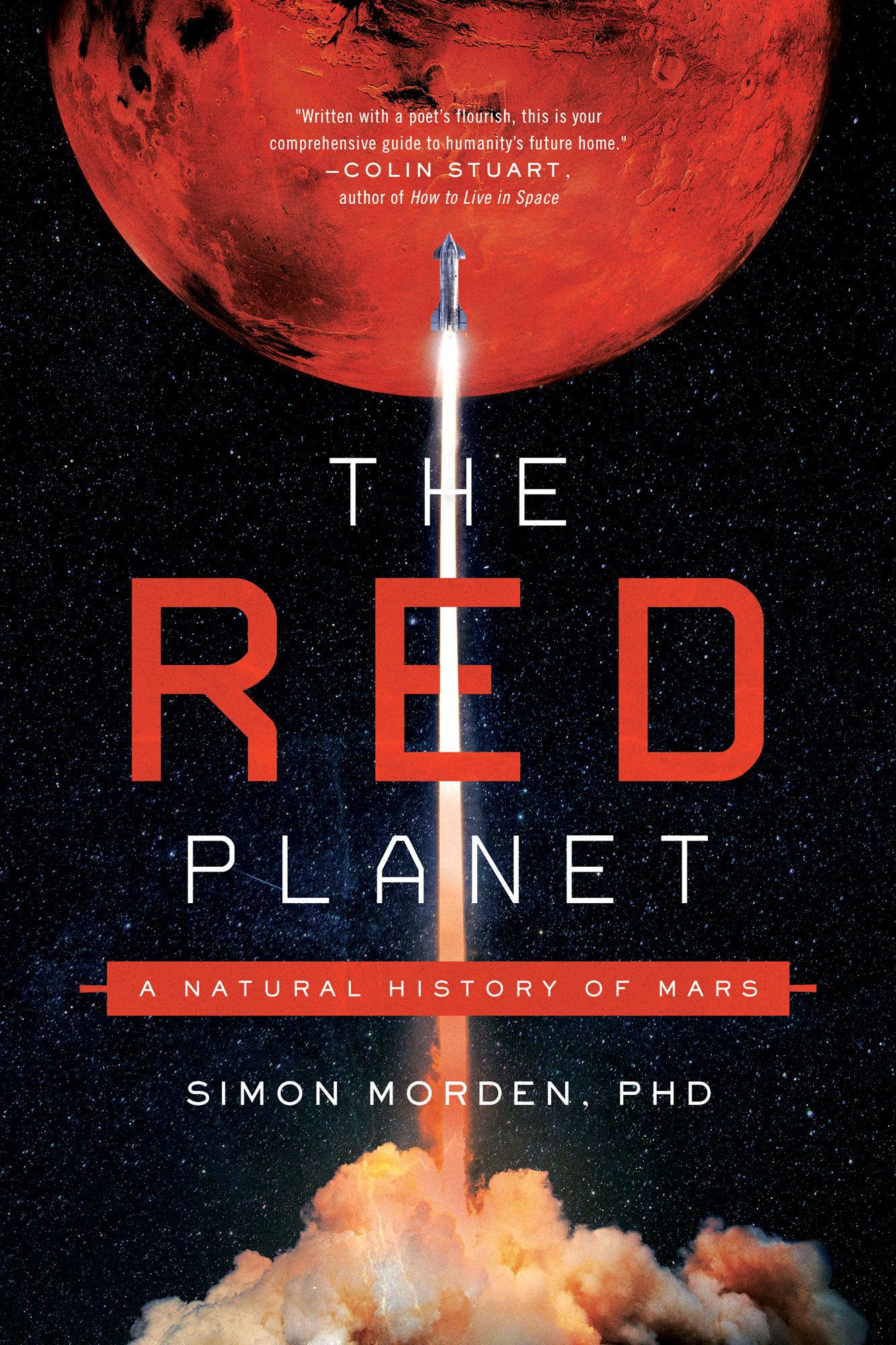
Written with a poets flourish, this is your comprehensive guide to humanitys future home.
Colin Stuart, author of How to Live in Space
The Red Planet
A Natural History of Mars
Simon Morden, PhD

For my mum, and in memory of my dad, neither of whom ever told me I needed to get a proper job
I grew up in a village with no street lights. The night sky was a vast bowl of dark, its edges lightened by the sodium glare of the nearby towns, its interior scratched by the navigation lights of airliners drifting down towards Heathrow. Venus, the bright morning and evening star, could hang on the horizon like a white jewel for days on end, and Jupiter and Saturn danced high in the sky. They wandered through the constellations, but were otherwise indistinguishable from stars. Mars, though, was different: from Earth it was clearly visible as a wavering point of red light. Identifiably, unmistakably red.
Mars was an inspiration to me, even if it always remained tantalisingly out of reach. But I did have a close encounter with it. I had progressed in an entirely unexceptional way from a degree in geology to a masters in geophysics, and a mid-course sidestep into a doctorate on the magnetic properties of meteorites. The secrets of how and when the planets formed are locked up in these rocks, and the information I needed was held in microscopic fragments of raw, unaltered ironnickel alloys. Later, in my first and only postdoctoral post, I ordered a piece of a meteorite from NASAs collection. It duly arrived and I ran the usual tests on it, only to be disappointed. The magnetic minerals had been weathered to rust. It was useless to my research, so I put it to one side and concentrated on other, more promising samples.
I had been right that there was no trace of iron metal in that sample; it had all been converted to iron oxides. But it hadnt happened here on Earth, and I should have looked harder, questioned more. Six months later, a laboratory in Japan analysed the trapped gases in the rock and announced their results. The previously miscategorised ALH84001 had formed on Mars, and the few grams of material Id already sent back to the USA were now part of a tiny group of known Martian rocks, far too precious for a junior researcher to work on. Id missed my chance. The economic tide receded. I left academic research. Eventually, I became a science-fiction writer. I even wrote stories set on Mars.
That lost opportunity was thirty years ago, always remembered with a sense of regret. Then, this unlooked-for grace. Im fully aware of how ridiculous it sounds, but writing this book feels like completion, finally closing a circle Id left half-drawn for far too long. I had held Mars in my hands once and now I could hold it again. And if I can convey even the smallest portion of the unfathomable joy I feel about this book, these words, this glorious scrapheap of a planet, then the journey to this point will have been worth it, because Mars is yours as much as it is mine.
I ts cold. So cold that the frost glittering on the rocks has been wrung out of the air itself, frozen and turned to ice. The Sun wont rise for another hour, but its already light enough to see by, although too diffuse to cast shadows. Above you is a sky of pale pink and pastel blue, shot through with white, hair-thin streamers that might be high clouds chasing away from the dawn.
The landscape is flat: not sheet flat, but plains flat, badlands flat. Its rough and rubbly, dominated not by the few variations in height, but by its sheer breadth and width and its utter emptiness. The distance to the horizon is an illusion youve not yet got used to: you think you can see forever, but its not even the distance of a parkrun. Still, you know, because youve seen the maps and the satellite images, that from where you stand theres nothing between you and the frozen north pole but an unending, monotonous flatness, punctuated by craters of every size that have been gouged out of the ground. The geography only begins to change far to the south, with a planet-girdling slope that climbs inexorably upwards for a hundred kilometres until it plateaus on the pockmarked highlands. Also beyond your closely curved horizon to the south-west, out of sight but looming heavily on your mind, is the land between the red soil and the bright sky where the giant volcanoes squat. They manage to be vastly broader than they are tall, but they still grow so high that they reach above even the clouds.
You feel light because you are light a third of your usual weight. Walking is difficult. Youre used to a falling gait, a motion that rocks you from right to left and back again, heel to toe. Using it here is not just inefficient but unwieldy. You try a few steps, as if youre a toddler again, and find yourself slow and unbalanced. Then you remember what they taught you and move into something halfway between a skip and a lope. You spend far longer in the air than you ever thought possible. Bringing both feet down within seconds of each other, you push off again for another metres-long stride. Its too similar to the dreams youve had of running without touching the ground to be entirely comfortable.
The soil is brittle and it snaps and squeaks as you press your deeply ridged boots into it. The dust that coats the planet from top to bottom is clay-fine, almost oily. Where it becomes loose, it drifts in persistent, dirty puffs and sticks to everything. Your bright white spacesuit is no longer pristine and itll never be clean again. You wear an ochre cast, deepening in colour towards your feet. Its your badge, your sign, and itll mark out your stay in days and weeks as it darkens.
The rover youre going to be using this morning is both basic and robust. Its little more than an oversized electric go-cart, designed so that as little can go wrong with it as possible. Its frame is made from open struts of lightweight but strong alloy, and its four wheels are independently powered by the fuel cell slung underneath the drivers seat. Each wheel is as tall as you are, and the treads around the circumference consist of hundreds of ridged metal plates. Each plate is sprung to provide suspension, and the amount of springiness is controlled by a computer, allowing the vehicle to navigate soft sand as well as hard rock and ice. The cargo youre driving is strapped to the back of the chassis, already covered in a thin film of dust.
You swing yourself up easily climbing in one-third Earths gravity isnt a problem and settle in the drivers seat. The controls are designed to be foolproof. Theres a steering wheel, a trigger to accelerate and brake, and a switch to put the whole vehicle in reverse. The screen in front of you tells you where you are and, critically, how much power you have left. You know that if you abuse that, youre going to be in real trouble. Someone will have to come out and find you before your air runs out. And perhaps they wont make it in time. The only thing keeping you alive at the moment and every moment youre outside is the suit youre wearing. Your life is measured in the minutes of air on your back and the watts in your batteries. If the tanks run empty, you will die quickly. If the heater circuits fail, you will die slowly.
You start up the rover and steer steadily north. Compass directions are by convention only, because theres nothing for a magnetic compass needle to find here. All your navigation is done by reference to the small constellation of satellites in orbit overhead. The landscape itself gives very few clues and you can see so little of it anyway. The best way back home is to follow your own tyre tracks, which will persist for a few weeks before being covered by wind-blown dust.
Font size:
Interval:
Bookmark:
Similar books «The Red Planet: A Natural History of Mars»
Look at similar books to The Red Planet: A Natural History of Mars. We have selected literature similar in name and meaning in the hope of providing readers with more options to find new, interesting, not yet read works.
Discussion, reviews of the book The Red Planet: A Natural History of Mars and just readers' own opinions. Leave your comments, write what you think about the work, its meaning or the main characters. Specify what exactly you liked and what you didn't like, and why you think so.




